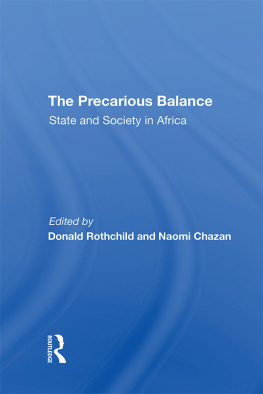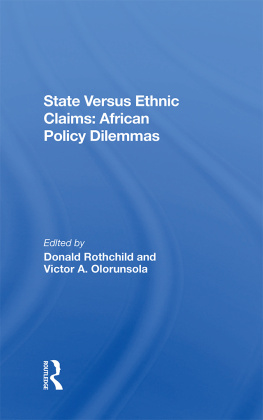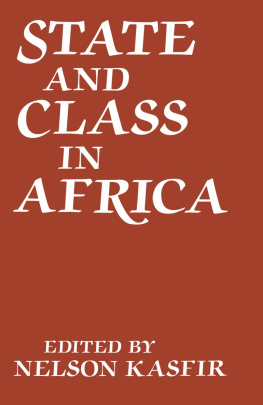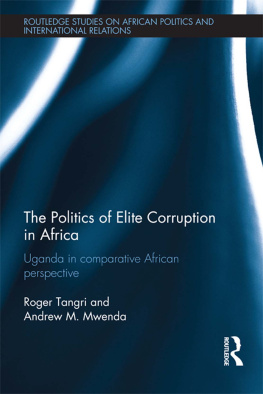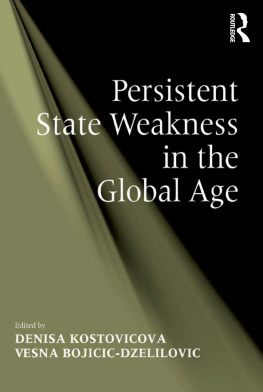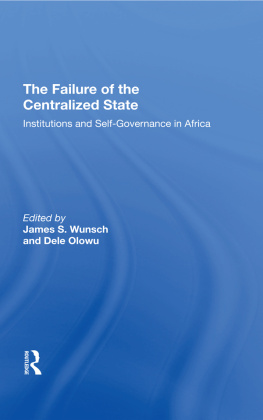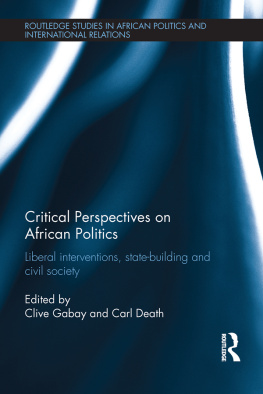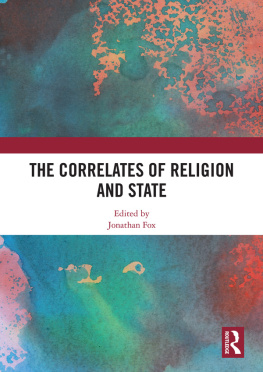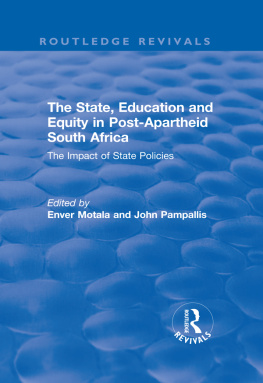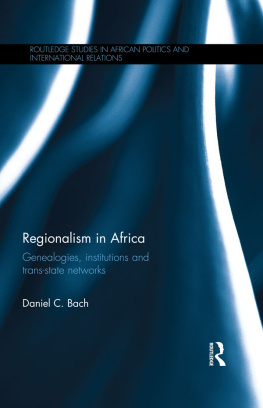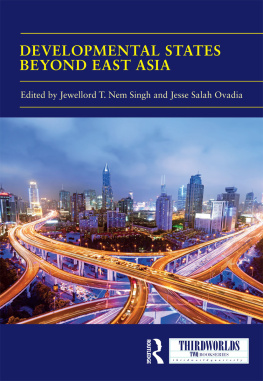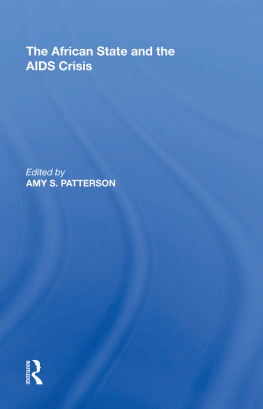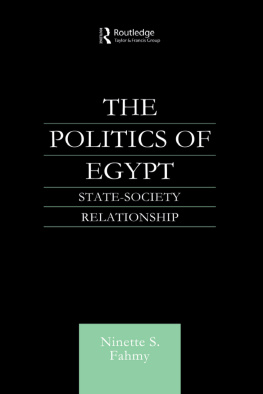The Precarious Balance
State and Society in Africa
African Modernization and Development Series
Paul Lovejoy, Series Editor
The Precarious Balance: State and Society in Africa, Donald Rothchild and Naomi Chazan
African Population and Capitalism: Historical Perspectives, Dennis D. Cordell and Joel W. Gregory
Patriarchy and Class: African Women in the Household and Workplace, Sharon B. Stichter and Jane L. Parpart
Southern African Labor Migration and the South African Gold Mines: 1960-1984, Jonathan Crush, Alan Jeeves, and David Yudeiman
African Cities in Crisis: Managing Rapid Urban Growth, Richard Stren and Rodney White
About the Book and Editors
Since independence, the political institutions of many African states have undergone a process of consolidation and subsequent deterioration. Constrained by external economic dependency and an acute scarcity of economic and technical resources, state officials have demonstrated a diminished capacity to regulate their societies. Public policies are agreed upon but ineffectively implemented by the weak institutions of the state. Although scholars have analyzed the various facets of state-building in detail, little systematic attention has been given to the issue of the decline of the state and mechanisms to cope with state ineffectiveness in Africa.
This book focuses especially on the character of the postcolonial state in Africa, the nature of and reasons for state deterioration, and the mechanisms and policies for coping with state malfunction. Scholars from Africa, the United States, Europe, and the Middle East combine a broad understanding of African political processes with expertise on specific regions. Their analytic and comparative perspective provides a comprehensive and timely treatment of this vital and heretofore neglected theme in African politics.
Donald Rothchild is professor of political science at the University of California, Davis. He is the author of Racial Bargaining in Independent Kenya and coeditor of State Versus Ethnic Claims: African Policy Dilemmas (Westview, 1982). Naomi Chazan is senior lecturer in political science and African studies at the Hebrew University of Jerusalem. She is the author of An Anatomy of Ghanaian Politics: Managing Political Recession, 19691982 (Westview, 1983) and coauthor of Ghana: Coping with Uncertainty (Westview, 1986).
The Precarious Balance
State and Society in Africa
edited by
Donald Rothchild and Naomi Chazan
First published 1988 by Westview Press, Inc.
Published 2019 by Routledge
52 Vanderbilt Avenue, New York, NY 10017
2 Park Square, Milton Park, Abingdon, Oxon OX14 4RN
Routledge is an imprint of the Taylor & Francis Group, an informa business
Copyright 1988 Taylor & Francis
All rights reserved. No part of this book may be reprinted or reproduced or utilised in any form or by any electronic, mechanical, or other means, now known or hereafter invented, including photocopying and recording, or in any information storage or retrieval system, without permission in writing from the publishers.
Notice:
Product or corporate names may be trademarks or registered trademarks, and are used only for identification and explanation without intent to infringe.
Library of Congress Cataloging-in-Publication Data
The Precarious balance: state and society in Africa/edited by
Donald Rothchild, and Naomi Chazan.
p. cm.(African modernization and development)
Includes index.
ISBN 0-86531-738-0
1. AfricaPolitics and government1960- 2. AfricaEconomic
conditions1960- 3. AfricaSocial conditions1960
I. Rothchild, Donald S. II. Chazan, Naomi, 1946- III. Series.
JQ1872.P74 1988
960'.32dc19 87-27302
CIP
ISBN 13: 978-0-367-29531-8 (hbk)
Contents
, Victor Azarya
, Crawford Young
, Thomas M. Callaghy
, John A.A. Ayoade
, Naomi Chazan
, Ren Lemarchand
, Janet MacGaffey
, Victor A. Olorunsola with Dan Muhwezi
, Jane L. Parpart
, Donald Rothchild and Michael W. Foley
, Kwame A. Ninsin
John Ravenhill
Timothy M. Shaw
, Naomi Chazan
Guide
Contemporary research on state-society relations in Africa has been almost as elusive as its subject matter. Much of the literature on African politics, reflecting a concern with stability and economic development, focuses extensively upon aspects of state consolidation. After independence, African leaders concentrated upon securing, extending, and transforming the institutions of rule they had inherited. Hence they impeded certain institutions that placed checks on their power while facilitating others that they thought would increase their control. Some leaders (Jomo Kenyatta in Kenya, Robert Mugabe in Zimbabwe, Felix Houphouet-Boigny in the Ivory Coast) have proved reasonably successful in building a coherent framework. In other countries, however, the results have been disappointing. Very different regimes were unable to stop the gradual erosion of state capabilities and a concomitant loss of legitimacy, authority, and power. As specific groups came to question the validity and viability of state institutions and organizing rules, state structures were undermined.
Those focusing on the twin processes of state consolidation or deterioration, whether approaching the subject from a modernization, Marxist, or neo-Marxist conceptual framework, have tended to make some similar assumptions: that political, social, and economic development are valued preferences in and of themselves and that participation at the political center is desirable because the state constitutes a superior mechanism for the fulfillment of economic and social aspirations. However, in recent years doubts have been cast on these assumptions. Many processes, such as the expansion of nonformal socioeconomic and political activities, could not be understood easily within the consolidation paradigm. Moreover, the premise of the centrality of the state could no longer be glibly corroborated in practice.
Consequently, a new research focus centering on the dynamic processes of interaction between state and society is now emerging and gaining scholarly attention. Remaining attentive to the operations of public institutions and official agencies while highlighting coping mechanisms in the informal sector, this approach attempts to uncover where and why transactions occur and to pinpoint areas and spheres of separation. The message emanating from Africa today is one of straddlingof constant movement between the official and unofficial, the private and the public, the rural and the urban. The result is a precarious balance between state and society. This book explores the rhythm of this changing relationship. In this respect, it seeks to gain an understanding of the historical context, the current manifestations, and some of the possible socioeconomic and political ramifications of these interactions. It is a study of shifting power relations and the complex exchanges that are essential to a more comprehensive understanding of the contemporary African scene.
This book took shape in the course of an international workshop on "The Reordering of the State in Africa" that was held July 1-8, 1985, at the Harry S. Truman Research Institute for the Advancement of Peace of the Hebrew University of Jerusalem. It brought together a diverse group of scholars from Africa, Europe, North America, and the Middle East who spent the week engaging in a lively interchange on the issues at hand.

